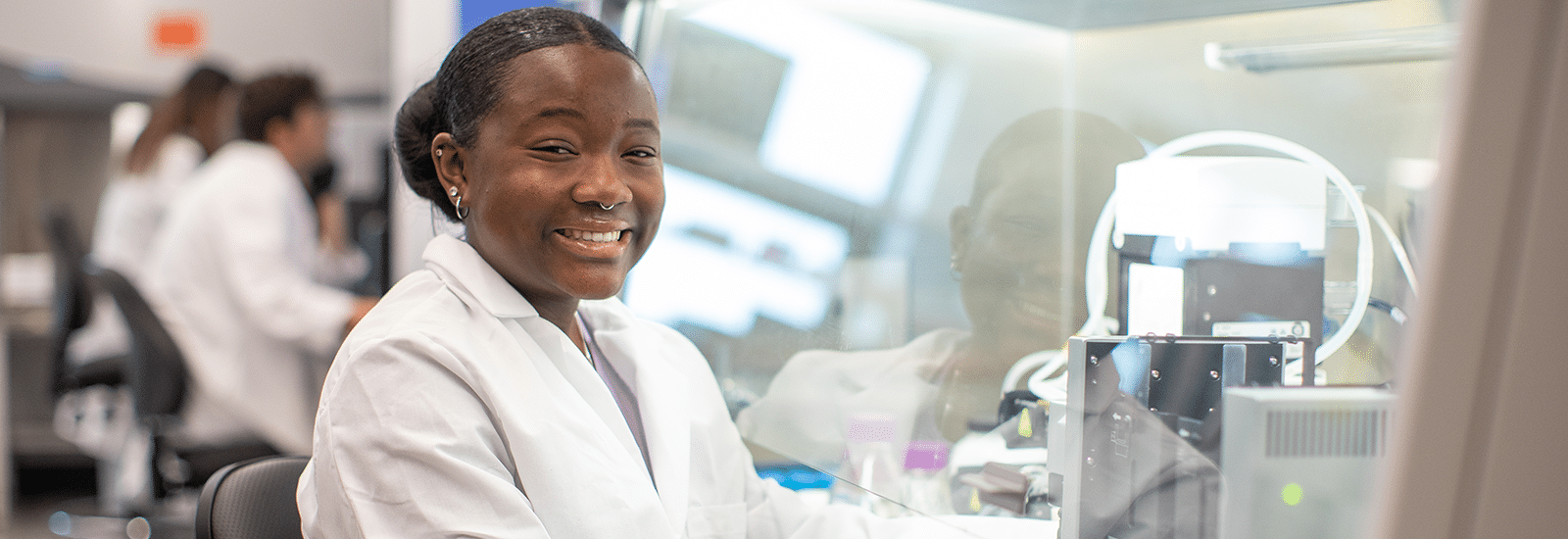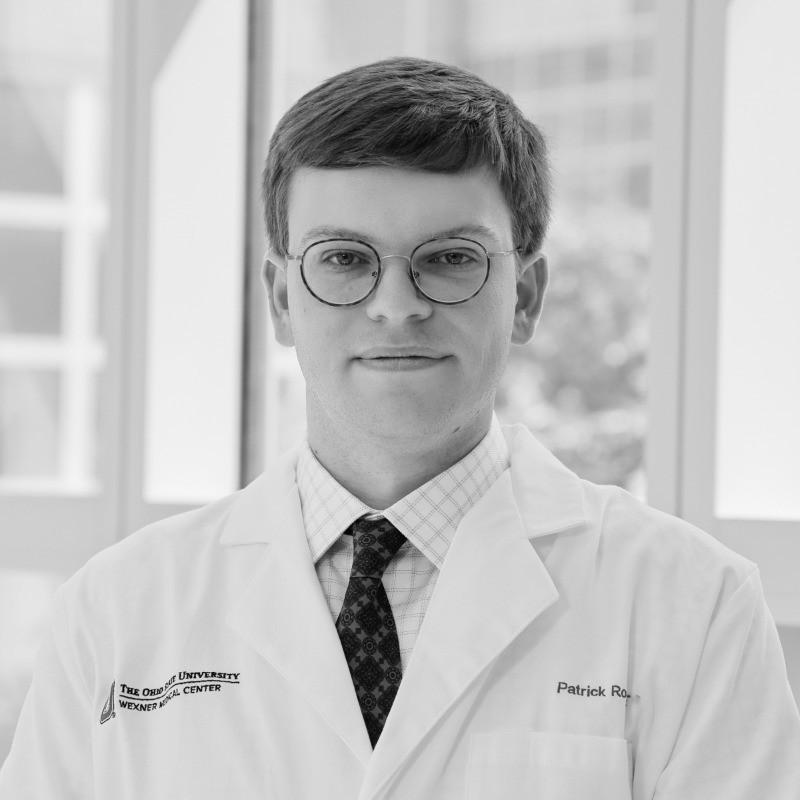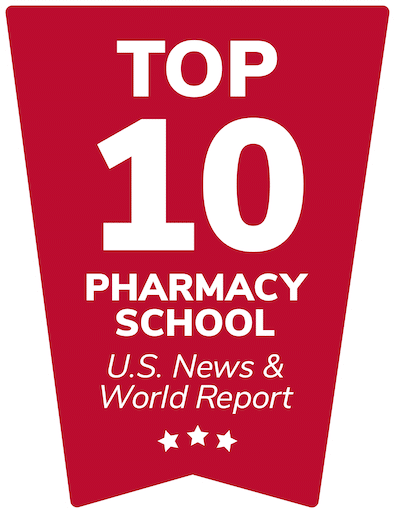Master of Science in Translational Pharmacology

June 15, 2026
August 25, 2026
Upcoming Information Session:
-
Register Today
MS Translational Pharmacology Info Session: March 10
03/10/2026 at 6:30 pm
Develop skills in preclinical or clinical trial design, toxicology, safety or clinical pharmacology, or advance your career in research administration.
The Master of Science in Translational Pharmacology program is designed for recent graduates and clinical professionals with a science, biotech or animal science background interested in advance their career and specializing in clinical trial design or preclinical toxicology and safety pharmacology studies.
The program is offered 100% online in an asynchronous format by the Ohio State College of Medicine Department of Biological Chemistry and Pharmacology and in collaboration with the Ohio State colleges of Pharmacy and Nursing, designed with you in mind to be flexible and work to fit your needs.
Choose from one of two specializations: Toxicology and Safety Pharmacology or Clinical Pharmacology and Clinical Trial Design.
This non lab-based program is 30 – 36 credits and offers coursework in pharmacology, toxicology, and biostatistics, as well as training in the conduct of clinical trials.
Two tracks are offered to specialize your training:
The online Master of Science in Translational Pharmacology offers two distinct specialization tracks, allowing students to tailor their education to their career goals.
This track emphasizes the application of pharmacological science in clinical research, bridging the gap between bench science and patient care. Students gain expertise in studying biomarkers, pharmacokinetics, and pharmacogenetics; designing and evaluating clinical trials; and analyzing adverse drug reactions and interactions.
Graduates may pursue clinical research careers as clinical trial administrators, project managers, quality assurance specialists, or roles in pharmaceutical sales. Those who already hold a doctoral degree may advance as clinical investigators, research scientists, clinical pharmacologists, or medical affairs specialists across the pharmaceutical industry, contract research organizations, and academic medical centers.
Upon completion of this specialization, students will have achieved core competencies as defined by the Joint Task Force for Clinical Trial Competency.
This track focuses on enhancing the safe development of biologically active compounds. Students study the identification, monitoring, and characterization of potential adverse effects through preclinical testing. They learn to plan, conduct, and interpret in vivo and in vitro drug safety studies, including assessments of cardiovascular, respiratory, and central nervous system function.
Career pathways for graduates include entry- and mid-level roles such as study coordinators or directors, quality assurance specialists, laboratory animal resource managers, and project or program managers. Doctoral-level professionals may use this degree to move into advanced research roles in organizations involved in preclinical drug testing.
Students completing this track will demonstrate competencies aligned with standards from the American Board of Toxicology and the Safety Pharmacology Society.
Frequently Asked Questions
Here are some frequently asked questions and answers we hope you find helpful. Please know that our team of Academic Enrollment Advisors are always ready to connect and answer any questions that are specific to your unique needs.
The online MS in Translational Pharmacology from The Ohio State University offers a unique, career-focused path for professionals looking to bridge the gap between laboratory research and clinical application. Designed for working professionals in the pharmaceutical, biotechnology, clinical research, and regulatory industries, this program delivers specialized training in drug development, regulatory affairs, and translational science—all 100% online.
Key advantages of choosing Ohio State’s program include:
- 🎓 Top-ranked, research-driven education from one of the nation’s premier academic medical centers and a leader in pharmacological sciences.
- 💻 Flexible, fully online format designed to fit the schedules of working professionals and adult learners.
- 💡 Curriculum focused on real-world application, including pharmacology, toxicology, clinical trial design, and regulatory strategy.
- 📈 Career-relevant outcomes, preparing graduates for roles in drug discovery, clinical development, FDA compliance, and more.
- 🤝 Access to world-class faculty actively engaged in translational research and regulatory innovation.
- 🧪 Interdisciplinary approach ideal for those with backgrounds in pharmacy, biology, biomedical sciences, nursing, or healthcare.
Whether you’re aiming to advance your current role or pivot into a new area of the drug development pipeline, Ohio State’s online MS in Translational Pharmacology provides the skills, knowledge, and network to move your career forward.
The online MS in Translational Pharmacology from The Ohio State University offers a unique, career-focused path for professionals looking to bridge the gap between This program is appropriate for pharmacists, physicians, nurse practitioners, nurses, other healthcare practitioners, as well as those having completed a B.S. or graduate degree in the pharmaceutical sciences or other bioscience-related field.
The online MS in Translational Pharmacology is designed for professionals who want to advance or transition into roles across the drug development, clinical research, regulatory affairs, and biomedical science industries. This program is ideal for individuals who are passionate about translating scientific discoveries into real-world therapies.
You should apply if you are:
- ✅ A clinical research professional, regulatory specialist, or laboratory scientist seeking advanced knowledge in pharmacology and drug development.
- ✅ A healthcare or life sciences graduate (biology, chemistry, pharmacy, nursing, or biomedical engineering) looking to enter the pharmaceutical or biotech industries.
- ✅ A professional in regulatory affairs, toxicology, or drug safety seeking a master’s degree to support career advancement or meet continuing education goals.
- ✅ A working professional looking for a fully online, flexible graduate program that offers real-world, interdisciplinary training in translational science.
- ✅ Interested in preparing for careers in clinical trial design, FDA regulatory strategy, preclinical research, or pharmacology-based innovation.
Whether you’re entering the field or upskilling to lead, Ohio State’s online MS in Translational Pharmacology provides the scientific foundation, regulatory insight, and career versatility needed to make an impact in the drug development pipeline.
Applicants not holding a bachelor’s degree or higher in a clinical, health science or bioscience field must have completed coursework in biology and chemistry; introductory courses in biochemistry and physiology are recommended but not required. Students who have not previously completed coursework in general pharmacology (graduate level) and pathophysiology (any level) will be required to complete these courses in the program.
Graduates with this master’s degree may find rewarding clinical research career opportunities as clinical trials administers, project managers, quality assurance specialists, and in pharmaceutical sales. In organizations conducting preclinical drug studies, graduates may find entry- and mid-level opportunities as study coordinators and directors, quality assurance specialists, laboratory animal resource managers, and project/program managers. Graduates already holding a doctorate degree may leverage this master’s degree to advance their careers as clinical investigators, research scientists, clinical pharmacologists, or medical affairs specialists in the pharmaceutical industry, contract research organizations, clinical research organizations, and academic medical centers.
Most of our Master of Science in Translational Pharmacology online classes will be limited to a maximum of 35 students to ensure instructors provide plenty of attention to each student.
Yes – You may take classes as a “Graduate Non-Degree” (GND) student. This application process is separate from the MS Translational Pharmacology application. You can find more information at the Graduate Non-Degree website. You may transfer up to nine credit hours of coursework (taken as a GND student) after you have applied, are accepted to, and have enrolled in the graduate program. This equates to three classes, as MS Translational Pharmacology classes are typically three-credit courses. If you are interested in taking 1-3 courses before entering one of the graduate programs, contact the program manager for a recommendation of courses in which to enroll.
The MS in Translational Pharmacology program is appropriate for healthcare practitioners as well as those having completed a B.S. or graduate degree in the pharmaceutical sciences or other bioscience-related field.
The classes use a variety of technologies and are run through Carmen (carmen.osu.edu), Ohio State’s learning management system. For each of the classes in which you enroll, the information will be posted in Carmen, including a syllabus. The deadline for assignments, readings, discussion posts, etc. is typically Sunday at midnight. We recommend you login daily to ensure you’re keeping up with classes.
Related Content
Related Content

Charting Success: Patrick Rowan’s Journey
MS in Translational Pharmacology alum, Patrick Rowan shares his career journey and presenting at the ACRP conference.

Discover how Ohio State Online enriched Sydney Leon’s journey in veterinary medicine.
Blending veterinary medicine and research: How Sydney Leon found her path with the Ohio State’s online MS in Translational Pharmacology

Master of Science in Translational Pharmacology – Clinical Pharmacology and Clinical Trial Design Track
Explore the Clinical Pharmacology and Clinical Trial Design track within the MS in Translational Pharmacology at Ohio State Online. Learn how this flexible, 100% online program prepares students for careers in clinical research, drug development, and regulatory science

Academic Calendar
For the convenience of online students, multiple start dates are offered during the academic calendar year for the online Master of Science in Translational Pharmacology program.
Academic Calendar
For the convenience of online students, multiple start dates are offered during the academic calendar year for the online Master of Science in Translational Pharmacology program.
Admission Criteria
Degree Requirements: For application to the MS Translational Pharmacology program, a clinical, health science or bioscience bachelors degree is preferred.
If an applicant has attended more than one university, all GPAs will be combined. Official GPAs are calculated by the university’s Graduate and Professional Admissions Office.
Prerequisite Coursework: Applicants to the MS Translational Pharmacology program not holding a bachelor’s degree or higher in a clinical, health science or bioscience field are encouraged to complete coursework in biology, chemistry and physiology before entry to the program.
Application Materials
Students must complete an online application at the Graduate and Professional Admissions Application website. The materials listed below must be uploaded to the online application.
Note: students who have taken classes in or completed a graduate-level (degree-granting) program at Ohio State should complete the online application for previously enrolled students. Contact Ashley Sherf (sherf.3@osu.edu) with any questions.
Students must submit current resume or CV which should highlight relevant experience.
Compose an essay describing your purpose for undertaking study in this graduate program, including a narrative discussion of your professional experience and career trajectory. This statement should not exceed two single-spaced pages. The purpose and goals statement is an opportunity to address each of the questions listed below, and also to demonstrate your writing skills. Consideration will be given to both the quality of your writing sample and the congruence between your stated goals and the master’s degree program.
- What specifically are your academic and career goals?
- What are your motivations for seeking advanced education in your designated specialty area?
- How did you come to your decision to seek graduate education in this specialty area?
- What are your primary personal attributes and what is the relationship of these attributes to your potential as a clinical/preclinical research professional?
Three letters of recommendation from individuals who are familiar with the applicant’s academic ability, work experience, contributions to clinical and preclinical research (if any), and potential to succeed in the program. Each recommendation should include a letter signed by your recommender and written on academic or business letterhead stationery. Recommendations should be requested from professors who are able to comment on your qualifications for graduate study. Recommendations from non-academic professionals are acceptable if you have extensive work experience with that individual and/or you have been away from academic institutions for some time.
To complete your application and verify your degree and undergraduate GPA, you must submit transcripts from all educational institutions you have attended.
When applying:
- You may upload scanned copies of official transcripts, diplomas, or degree certificates to the online application system. Note: You do not need to submit transcripts for coursework or degrees earned from The Ohio State University.
- These scans help form a complete application packet, but they do not replace the need for official documents.
What is not accepted:
- Advising reports
- Unofficial transcripts or scans labeled “UNOFFICIAL”
- Documents with a URL across the top
- Transcripts missing the institution’s name, seal, stamp, or GPA
These types of documents will not be used for degree verification or GPA calculation.
Exception: You do not need to submit transcripts for coursework or degrees earned from The Ohio State University.
Only if required
There is a $60 Non-refundable Application Fee (paid at time of application submission)
*Fee waiver available for current Graduate Non-Degree students and current OSU Doctor of Pharmacy students wishing to complete the combined PharmD and MS in Translational Pharmacology programs. Email Ashley Sherf (sherf.3@osu.edu) for details if this applies to you. Waiver requests must be submitted at least 10 business days prior to the application deadline.

The Ohio State University participates in the State Authorization Reciprocity Agreements (SARA).
SARA is a national initiative that increases student access to distance education courses and programs while maintaining compliance with state regulations. Institutions participating in SARA can offer educational opportunities in all 49 SARA member states, the District of Columbia, the U.S. Virgin Islands and Puerto Rico without seeking individual approval in each state.
California is not a SARA member state, however, OSU may offer online courses and programs to students located in California under the California Private Post-Secondary Act of 2009.
The Application Process
Once you understand your program’s admission criteria, please note the application deadline. You’ll need a quiet space and a variety of materials for your application. To learn more, please see our Admissions page for the full process. Ready to Apply? Find your application here.
Career Outlook
Graduates with this master’s degree may find rewarding clinical research career opportunities as clinical trials administers, project managers, quality assurance specialists, and in pharmaceutical sales. In organizations conducting preclinical drug studies, graduates may find entry- and mid-level opportunities as study coordinators and directors, quality assurance specialists, laboratory animal resource managers, and project/program managers. Graduates already holding a doctorate degree may leverage this master’s degree to advance their careers as clinical investigators, research scientists, clinical pharmacologists, or medical affairs specialists in the pharmaceutical industry, contract research organizations, clinical research organizations, and academic medical centers.
Students pursuing their master’s in pharmacology complete a culminating experience through a practicum or research study with a partnering clinical research site. Graduates holding a doctorate (MD, DO, PharmD, PhD, etc.) may seek careers as clinical investigators, research scientists, or medical affairs specialists in the pharmaceutical industry, clinical research organizations, or academic medical centers. Graduates at the master’s level may find rewarding clinical research career opportunities in clinical trials administration, project management, quality assurance, and pharmaceutical sales.
Top Occupations by Median Income
What They Do
Conduct research using bioinformatics theory and methods in areas such as pharmaceuticals, medical technology, biotechnology, computational biology, proteomics, computer information science, biology and medical informatics. May design databases and develop algorithms for processing and analyzing genomic information, or other biological information.
Work Activities
Develop new software applications or customize existing applications to meet specific scientific project needs. Communicate research results through conference presentations, scientific publications, or project reports. Create novel computational approaches and analytical tools as required by research goals.
Wage Range
- Entry Level: $54,500
- Mid Level: $93,330
- Senior Level: $159,780
Projected Growth
5.6%
Related Careers
- Bioinformatics Technicians
- Biostatisticians
- Data Scientists
- Geneticists
- Molecular and Cellular Biologists
Job Sectors
- Biology
- Computers and Electronics
- Mathematics
- English Language
- Chemistry
What They Do
Research or study basic principles of plant and animal life, such as origin, relationship, development, anatomy, and functions.
Work Activities
Program and use computers to store, process, and analyze data. Prepare technical and research reports, such as environmental impact reports, and communicate the results to individuals in industry, government, or the general public. Supervise biological technicians and technologists and other scientists.
Wage Range
- Entry Level: $54,500
- Mid Level: $93,330
- Senior Level: $159,780
Projected Growth
5.6%
Related Careers
- Geneticists
- Microbiologists
- Molecular and Cellular Biologists
- Soil and Plant Scientists
- Zoologists and Wildlife Biologists
Job Sectors
- Biology
- Education and Training
- English Language
- Mathematics
- Administration and Management
What They Do
Develop and apply biostatistical theory and methods to the study of life sciences.
Work Activities
Draw conclusions or make predictions, based on data summaries or statistical analyses. Analyze clinical or survey data, using statistical approaches such as longitudinal analysis, mixed-effect modeling, logistic regression analyses, and model-building techniques. Write detailed analysis plans and descriptions of analyses and findings for research protocols or reports.
Wage Range
- Entry Level: $60,390
- Mid Level: $103,300
- Senior Level: $170,700
Projected Growth
11.8%
Related Careers
- Bioinformatics Scientists
- Bioinformatics Technicians
- Clinical Data Managers
- Data Scientists
- Statisticians
Job Sectors
- Mathematics
- English Language
- Computers and Electronics
- Medicine and Dentistry
What They Do
Apply knowledge of health care and database management to analyze clinical data, and to identify and report trends.
Work Activities
Design and validate clinical databases, including designing or testing logic checks. Process clinical data, including receipt, entry, verification, or filing of information. Generate data queries, based on validation checks or errors and omissions identified during data entry, to resolve identified problems.
Wage Range
- Entry Level: $63,650
- Mid Level: $112,590
- Senior Level: $194,410
Projected Growth
36%
Related Careers
- Bioinformatics Technicians
- Clinical Research Coordinators
- Data Scientists
- Health Informatics Specialists
- Social Science Research Assistants
Job Sectors
- English Language
- Computers and Electronics
- Customer and Personal Service
- Mathematics
- Medicine and Dentistry
What They Do
Direct nursing staff in the provision of patient care in a clinical practice setting, such as a hospital, hospice, clinic, or home. Ensure adherence to established clinical policies, protocols, regulations, and standards.
Work Activities
Provide specialized direct and indirect care to inpatients and outpatients within a designated specialty, such as obstetrics, neurology, oncology, or neonatal care. Collaborate with other health care professionals and service providers to ensure optimal patient care. Read current literature, talk with colleagues, or participate in professional organizations or conferences to keep abreast of developments in nursing.
Wage Range
- Entry Level: $66,030
- Mid Level: $93,600
- Senior Level: $135,320
Related Careers
- Acute Care Nurses
- Advanced Practice Psychiatric Nurses
- Critical Care Nurses
- Nurse Practitioners
- Registered Nurses
Job Sectors
- Medicine and Dentistry
- Education and Training
- English Language
- Psychology
- Biology
What They Do
Plan, direct, or coordinate clinical research projects. Direct the activities of workers engaged in clinical research projects to ensure compliance with protocols and overall clinical objectives. May evaluate and analyze clinical data.
Work Activities
Schedule subjects for appointments, procedures, or inpatient stays as required by study protocols. Perform specific protocol procedures such as interviewing subjects, taking vital signs, and performing electrocardiograms. Assess eligibility of potential subjects through methods such as screening interviews, reviews of medical records, or discussions with physicians and nurses.
Wage Range
- Entry Level: $79,830
- Mid Level: $161,180
- Senior Level:
Projected Growth
7.5%
Related Careers
- Clinical Data Managers
- Clinical Nurse Specialists
- Health Informatics Specialists
- Health Specialties Teachers, Postsecondary
- Social Science Research Assistants
Job Sectors
- Customer and Personal Service
- English Language
- Administrative
- Medicine and Dentistry
What They Do
Perform routine medical laboratory tests for the diagnosis, treatment, and prevention of disease. May work under the supervision of a medical technologist.
Work Activities
Conduct chemical analyses of body fluids, such as blood or urine, using microscope or automatic analyzer to detect abnormalities or diseases and enter findings into computer. Analyze the results of tests or experiments to ensure conformity to specifications, using special mechanical or electrical devices. Set up, maintain, calibrate, clean, and test sterility of medical laboratory equipment.
Wage Range
- Entry Level: $38,020
- Mid Level: $61,890
- Senior Level: $97,990
Related Careers
- Cardiovascular Technologists and Technicians
- Cytogenetic Technologists
- Histology Technicians
- Histotechnologists
- Medical and Clinical Laboratory Technologists
Job Sectors
- Biology
- Chemistry
- English Language
- Mathematics
- Customer and Personal Service
What They Do
Perform complex medical laboratory tests for diagnosis, treatment, and prevention of disease. May train or supervise staff.
Work Activities
Conduct chemical analysis of body fluids, including blood, urine, or spinal fluid, to determine presence of normal or abnormal components. Analyze laboratory findings to check the accuracy of the results. Operate, calibrate, or maintain equipment used in quantitative or qualitative analysis, such as spectrophotometers, calorimeters, flame photometers, or computer-controlled analyzers.
Wage Range
- Entry Level: $38,020
- Mid Level: $61,890
- Senior Level: $97,990
Related Careers
- Cytogenetic Technologists
- Cytotechnologists
- Histology Technicians
- Histotechnologists
- Medical and Clinical Laboratory Technicians
Job Sectors
- Biology
- Medicine and Dentistry
- Customer and Personal Service
- Chemistry
- English Language
What They Do
Examine, evaluate, and investigate eligibility for or conformity with laws and regulations governing contract compliance of licenses and permits, and perform other compliance and enforcement inspection and analysis activities not classified elsewhere.
Work Activities
Warn violators of infractions or penalties. Evaluate applications, records, or documents to gather information about eligibility or liability issues. Advise licensees or other individuals or groups concerning licensing, permit, or passport regulations.
Wage Range
- Entry Level: $46,230
- Mid Level: $78,420
- Senior Level: $130,030
Projected Growth
5.4%
Related Careers
- Claims Adjusters, Examiners, and Investigators
- Compliance Managers
- Eligibility Interviewers, Government Programs
- Environmental Compliance Inspectors
- Government Property Inspectors and Investigators
Job Sectors
- Law and Government
- English Language
- Customer and Personal Service
- Public Safety and Security
- Computers and Electronics
What They Do
Plan, direct, or coordinate activities of an organization to ensure compliance with ethical or regulatory standards.
Work Activities
Report violations of compliance or regulatory standards to duly authorized enforcement agencies as appropriate or required. Identify compliance issues that require follow-up or investigation. Discuss emerging compliance issues to ensure that management and employees are informed about compliance reporting systems, policies, and practices.
Wage Range
- Entry Level: $68,860
- Mid Level: $136,550
- Senior Level: $227,590
Projected Growth
5.7%
Related Careers
- Compliance Officers
- Environmental Compliance Inspectors
- Management Analysts
- Regulatory Affairs Managers
- Regulatory Affairs Specialists
Job Sectors
- Law and Government
- English Language
- Administration and Management
- Customer and Personal Service
- Personnel and Human Resources
What They Do
Conduct research dealing with the understanding of human diseases and the improvement of human health. Engage in clinical investigation, research and development, or other related activities.
Work Activities
Follow strict safety procedures when handling toxic materials to avoid contamination. Evaluate effects of drugs, gases, pesticides, parasites, and microorganisms at various levels. Plan and direct studies to investigate human or animal disease, preventive methods, and treatments for disease.
Wage Range
- Entry Level: $61,860
- Mid Level: $100,590
- Senior Level: $168,210
Projected Growth
11.5%
Related Careers
- Biochemists and Biophysicists
- Epidemiologists
- Geneticists
- Microbiologists
- Physicians, Pathologists
Job Sectors
- Biology
- English Language
- Medicine and Dentistry
- Chemistry
- Mathematics
What They Do
Conduct research in the genetics, nutrition, reproduction, growth, and development of domestic farm animals.
Work Activities
Study nutritional requirements of animals and nutritive values of animal feed materials. Write up or orally communicate research findings to the scientific community, producers, and the public. Develop improved practices in feeding, housing, sanitation, or parasite and disease control of animals.
Wage Range
- Entry Level: $48,440
- Mid Level: $79,120
- Senior Level: $235,750
Projected Growth
7.9%
Related Careers
- Biochemists and Biophysicists
- Food Scientists and Technologists
- Microbiologists
- Soil and Plant Scientists
- Veterinarians
Job Sectors
- Biology
- Mathematics
- English Language
- Chemistry
- Food Production
What They Do
Develop and implement a set of techniques or analytics applications to transform raw data into meaningful information using data-oriented programming languages and visualization software. Apply data mining, data modeling, natural language processing, and machine learning to extract and analyze information from large structured and unstructured datasets. Visualize, interpret, and report data findings. May create dynamic data reports.
Work Activities
Analyze, manipulate, or process large sets of data using statistical software. Apply feature selection algorithms to models predicting outcomes of interest, such as sales, attrition, and healthcare use. Apply sampling techniques to determine groups to be surveyed or use complete enumeration methods.
Wage Range
- Entry Level: $63,650
- Mid Level: $112,590
- Senior Level: $194,410
Projected Growth
36%
Related Careers
- Bioinformatics Technicians
- Financial Quantitative Analysts
- Operations Research Analysts
- Statistical Assistants
- Statisticians
What They Do
Manage, improve, and protect natural resources to maximize their use without damaging the environment. May conduct soil surveys and develop plans to eliminate soil erosion or to protect rangelands. May instruct farmers, agricultural production managers, or ranchers in best ways to use crop rotation, contour plowing, or terracing to conserve soil and water; in the number and kind of livestock and forage plants best suited to particular ranges; and in range and farm improvements, such as fencing and reservoirs for stock watering.
Work Activities
Apply principles of specialized fields of science, such as agronomy, soil science, forestry, or agriculture, to achieve conservation objectives. Plan soil management or conservation practices, such as crop rotation, reforestation, permanent vegetation, contour plowing, or terracing, to maintain soil or conserve water. Monitor projects during or after construction to ensure projects conform to design specifications.
Wage Range
- Entry Level: $45,260
- Mid Level: $67,950
- Senior Level: $107,720
Projected Growth
5.6%
Related Careers
- Environmental Restoration Planners
- Environmental Scientists and Specialists, Including Health
- Industrial Ecologists
- Range Managers
- Soil and Plant Scientists
Job Sectors
- English Language
- Biology
- Geography
- Mathematics
- Customer and Personal Service
National occupational information in Ohio State Online’s Career Outlook tool is sourced from O*NET Online and the U.S. Bureau of Labor Statistics (BLS). The median annual wage displayed to the right of each occupational title above is based on the BLS Employment Projections program. Outlook and percent change indicate projected growth or decline over the next 10 years.
Whether you’re looking to grow in your current career or make a career change altogether, Ohio State’s online programs can help you achieve your goals. Learn what the outlook is for your current or next career move using O*Net’s My Next Move tool.
Curriculum
The credits required for the Master of Science in Translational Pharmacology range from 30-36 with two tracks to specialize some of the coursework:
Track #1 – Clinical Pharmacology and Clinical Trial Design Track
Track #2 – Toxicology and Safety Pharmacology Track
The curriculum is organized into three curricular areas:
#1 – Based on the specialized track – either clinical pharmacology and clinical trial design coursework or toxicology and safety pharmacology coursework.
#2 – The conducting of clinical trials or preclinical studies coursework.
#3 – The program’s culminating project which is the development of clinical trial or preclinical study protocol and manuscript.
Note: The online MS Translational Pharmacology degree is not a lab-based program.
Required Core Course: Introductory course emphasizing the general principles of pharmacology using a systems-based and mechanism-based approach. The course provides a simple overview of the subject.
Required Core Course: This course provides a fundamental overview of human pathophysiology by comparing dysfunctional body processes to normal physiological function. Case studies will be applied to pathophysiological phenomena.
Required Core Course: The broad intent of this course is to highlight the importance of ethics in biomedical research and to explore how critical ethical thinking can be used to analyze personal decision-making, public regulation, and the law concerning advanced biomedical sciences/technologies and their clinical applications.
Required Core Course: Principles of toxicology, physiology and pharmacology as they relate to adverse and unanticipated drug effects. Emphasis on cardiovascular, nervous, pulmonary, liver, and kidney systems. Open to students in MS Pharmacology program. Other students, including advanced undergraduate students, may enroll with permission of instructor. Completion of a basic pharmacology class useful but not required.
Required Core Course: Introduction to basic and advanced concepts in pharmacokinetics, pharmacodynamics, and pharmacology for clinical investigators and other research professionals participating in the conduct of clinical trials. Prior coursework in pharmacology recommended.
- PUBHBIO 6210: Applied Biostatistics I
- PUBHBIO 6211: Applied Biostatistics II
- BIOPHRM/Nursing/Pharmacy 7560: Clinical Trials I: Design and Regulation
- BIOPHRM/Nursing/Pharmacy 7561: Clinical Trials II: Management and Leadership
- Pharmacy 5700: Introduction to Personalized Therapeutics and Pharmacogenomics
- BIOPHRM 7550: Research Applications of Clinical Pharmacology
- Pharmacy 7784: Data Analysis and Interpretation for Clinical and Preclinical Research (biostatistics)
- Pharmacy 7562: Design and Management of Preclinical Studies
- Pharmacy 7583: Advanced Organ System Toxicology and Risk Assessment
- Pharmacy 7588: Toxic Substances
- Pharmacy 7580: Principles of Safety Pharmacology
- Pharmacy 7586: Integrative In Vivo Modeling for Drug Development: Application for Safety and Clinical Pharmacology
| BIOPRHM 7598: Scientific Writing: Clinical Trial Protocol and Manuscript Development | Pharmacy 7597: Scientific Writing: Preclinical Study Protocol and Manuscript Development |
*General pharmacology may be waived for clinicians (MD, DO, PharmD, NP, PA, etc.) and other students who have completed a graduate-level general pharmacology course (grade B or better).
**Pathophysiology may be waived for clinicians and other students who have completed any college-level pathophysiology course (graduate or undergraduate, grade B or better).Department abbreviations:
- BIOPHRM = Biological Chemistry and Pharmacology
- CBG = Cancer Biology and Genetics
- HTHRHSC = Health and Rehabilitation Sciences
- PUBHBIO = Public Health Biostatistics
Understanding Online Course Types
As you research the right online program for you, you likely will come across the terms “asynchronous” and “synchronous.” Learn what these terms mean and how they’re important to consider when understanding how a program will fit into your life.
Learn More

Program Faculty
The Mission of The Ohio State University College of Pharmacy is to advance the pharmacy profession and patient-centered care across Ohio and around the globe through innovative teaching and practice, groundbreaking research, and transformative outreach and engagement.
Meet some of the faculty that support our mission every single day through the work they do.

Jen Plahovinsak, MS, DABT
Director MS Translational Pharmacology Program | Assistant Professor – Clinical
Professor Jennifer (Jen) Plahovinsak is the Director of the Master of Science in Translational Pharmacology program. Jen’ s research focuses on the design and development of technology-enhanced learning environments for science education, graphic and instructional design to support learning, key learner characteristics for graduate students, curricular development for online toxicology courses, and quality strategies for online program success. Additionally, her interests include the development of relevant preclinical models to support medical countermeasure research programs. Jen has been certified as a Diplomate of the American Board of Toxicology since 2015.
Mitch A. Phelps, PhD
Director of the Pharmacoanalytical Shared Resource, OSU Comprehensive Cancer Center
Brian Roche, PhD, DSP, DABT
Assistant Professor of Pharmacy Practice
Frederick Villamena, PhD
Associate Professor, College of Medicine, Dept. of Biological Chemistry and Pharmacology
Testimonials
Don’t just take our word for it. Hear what MSTP alumni are saying about Ohio State Online’s Master of Science in Translational Pharmacology program.
Tuition Fee Overview
Investing in your future with a higher education degree is one of the best investments you can make for your future success. At Ohio State, we know understanding your program’s cost is an important part of your decision-making process. Below are the tuition fees you can expect with your program. Actual costs may vary. Estimates are based on the expenses typical of an Ohio State Online student, who would take 6 credit hours each semester as a part-time undergraduate student (or 8 credit hours for graduate programs), or 12 credit hours (for undergraduate programs) each semester as a full-time student.
The range of credit hours for the MS in Translational Pharmacology program is 30-36 but for calculation purposes, the tuition calculator reflects 33 credit hours so individual’s totals may be more or less depending on their total credits needed for completion. If you have transfer credits that are reviewed and approved, your total cost may also vary.
Tuition fees are subject to change. The MSTP program has a range of 30-36 credit hours, the tuition calculator is calculating off an average of 33 credit hours. The table above serves as a guide and not an official bursar’s bill. Full-Time costs are total tuition costs per semester.
Financial Aid Resource
Financial Aid Resource
Other Expenses to be aware of:
- Application Fee: $60 for U.S. residents/$70 for international residents
- Textbook estimate: $900 (total)
Tuition is calculated on a per-credit hour basis. Master’s courses are three credit hours per course. This program credits ranges from 30-36 to complete, the tuition calculator is calculating off an average of 33 credit hours.
| Description: | Cost: |
|---|---|
| Full-time (8 or more credits) Ohio Resident per semester: | $6,999.00 |
| Full-time (8 or more credits) non-Ohio Resident per semester: | $7,199.00 |
| Part-time (3-6 credits) Ohio Resident per semester: | $2,687.14 – $5,274.28 |
| Part-time (3-6 credits) non-Ohio Resident per semester: | $2,887.14 – $5,474.28 |
Full-time students can expect to complete the MS program in three semesters. Part-time students can expect a completion in 6-12 semesters.
*Tuition is capped at 8 credit hours a semester. Students enrolled in 8 or more credit hours a semester will pay one flat fee.
Financial Aid and Scholarships
Due to the size of our program, we do not offer program-specific scholarships, funding, or grants.
Financial aid is available through FAFSA. For specific scholarships or funding, we recommend visiting the Office of International Affairs website for scholarships available. You may also wish to explore ScholarshipUniverse or contact your employer to see if they offer tuition assistance or reimbursement.
Should you have any specific questions regarding cost and financial counsel, please reach out to the Student Financial Aid Office for assistance.
Related Articles
Related Articles

How to ask your employer for tuition reimbursement
How to Pay for Your Online Program

Tips for Online Learning from Ohio State Students and Faculty
Get Started
Connect with a knowledgeable Enrollment Advisor who can help answer your questions and explain different aspects of the more than 80 online degrees and certificates offered at Ohio State. They are here to help you on your education journey.






